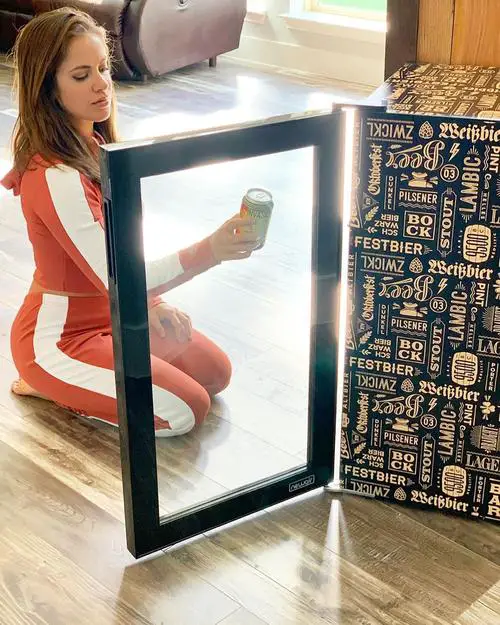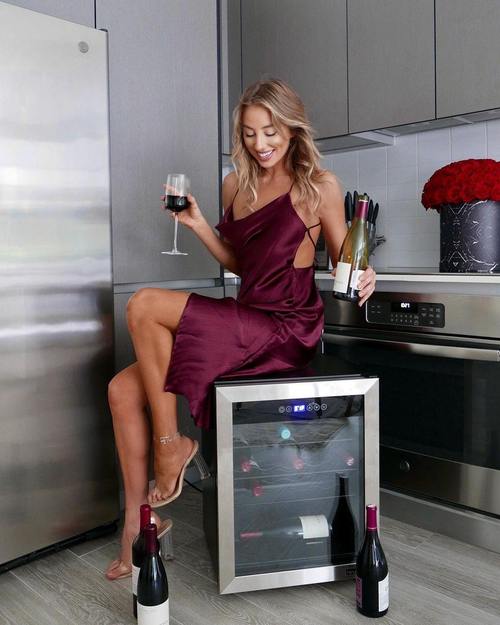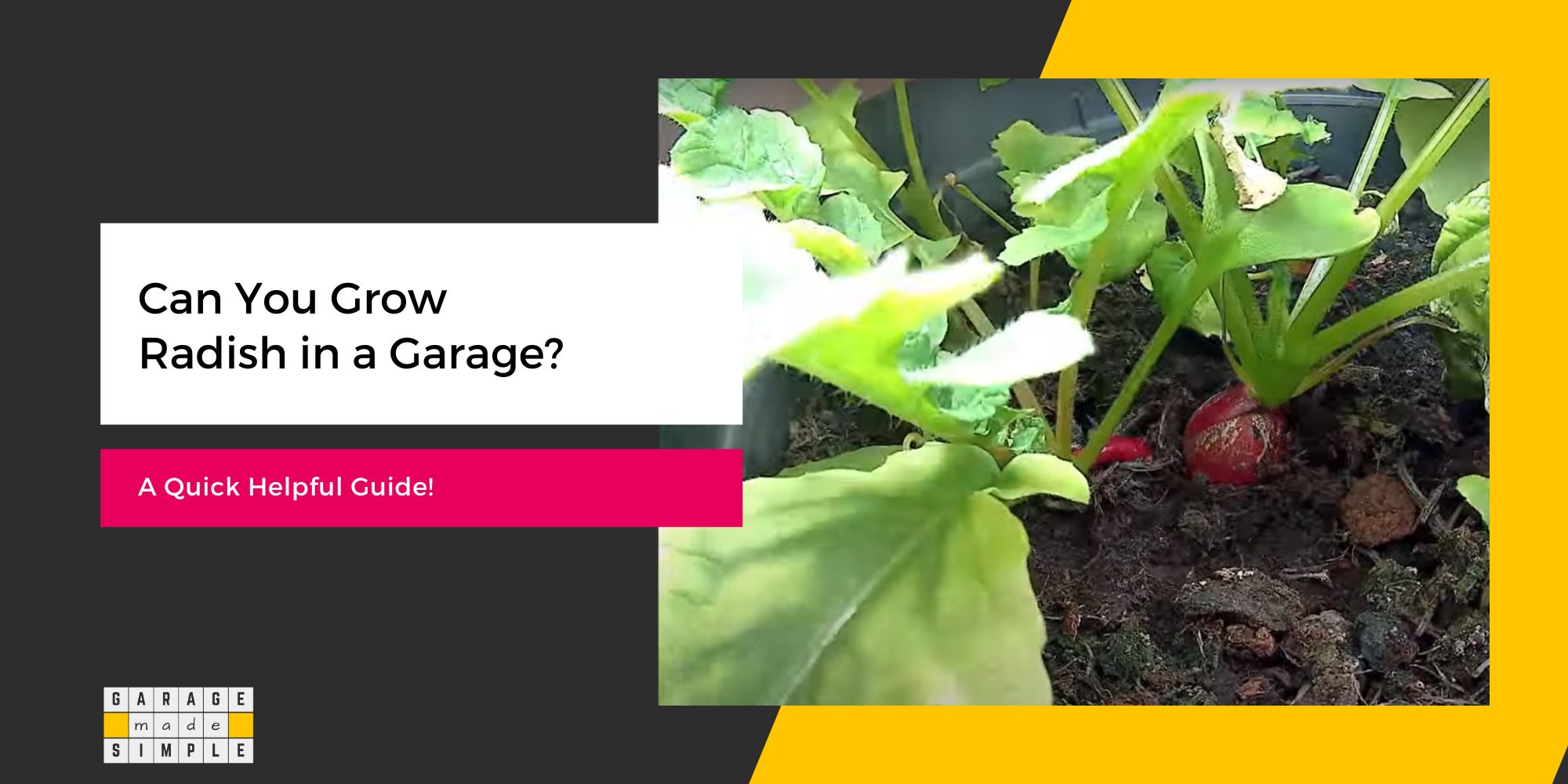How To Store Alcohol In A Garage? Best Guide
As an Amazon Associate, I earn from qualifying purchases.
Can you Store Alcohol in a Garage?
Yes, you can store alcohol in a garage, but only if the garage is climate-controlled. This means that the temperature and humidity should be kept constant, with a temperature between 55 and 65 degrees Fahrenheit and a humidity level between 50 and 70 percent.
The quality and taste of alcohol tends to deteriorate with temperature swings, particularly towards the hotter side, exposure to light and high humidity. This is why the general advice is that a garage is not the best place to store alcohol.

The reason to store alcohol in a garage varies from person to person. A few common reasons are:
- A few bottles or cans for a drink or two, after a hard day fixing your car or a workout in the garage gym.
- A few dozen for the man cave or your pub in the garage.
- More than a few dozen that you got for the upcoming Christmas party or birthday bash.
- A lot, because you are an avid collector or a trader or are prepping for the doomsday!
In the first three scenarios the time frame likely ranges from a few days to a few weeks. In the last case it is long term.
Now, if your garage or the space where you will keep the alcohol in the garage, is climate controlled, then the garage is as good a place as any, in your home, to store alcohol.
In this post I will dive into the best storage conditions for the most popular alcohols and how you can store alcohol in a garage the right way.
How To Store Beer in a Garage?
Whatever you do, beer can not be stored forever. Beer is an organic food product. The decay begins as soon as beer is brewed and packaged.
Most beer manufacturers recommend drinking the beer within three months of it being brewed. Of course! Beer is for drinking not storing!
Higher temperatures will hasten the process of decay.
This tip from newair is super useful
Consider the 3-30-300 Rule: You can keep beer for just three days at 90 degrees (like in your hot car), but it will last for 30 days in 72 degrees and 300 days at 38 degrees.
A climate controlled garage will likely maintain its temperature around 70 degrees. You can store unopened cans or bottles of beer in a climate controlled garage. The beer will taste just fine, even after a month.
Light is bad for Beer
When it comes to beer, light is more detrimental. Light will start a chemical reaction in the hops that releases sulfur. Sulfur has this rotten egg smell and can make good beer smell bad.
This is the reason beer bottles are almost never made of clear glass. Actually aluminum cans are even better at blocking light. So if you are going to be storing beer bottles or cans in your garage, just tuck them away in a dark corner.
Beer Fridge
Now if your garage is not climate controlled, consider investing in NewAir Beverage Refrigerator Cooler.
NewAir Beverage Refrigerator Cooler
Holds everything from soda, beer, wine and more so you can stay stocked for any occasion.
Features a reversible glass door and timeless stainless-steel frame so you can view your contents from a glance.
Yes, a refrigerator can be kept in the garage! Nothing like a cold beer after sweating it out on your garage DIY project!
How to Store Wine in a Garage?
Wine is a lot more sensitive to the environment. Moreover, typically you like to keep wine for a longer period of time, sometimes waiting for the right occasion or event.
Now if you are a wine connoisseur, storing hundreds of fine wines then you are on the wrong page. You should be checking out blog posts on wine cellars. But if you are a regular wine loving guy or gal, then you will get some good tips here.
For one, buy wine that you intend to drink in the next few months. Wine for you and me are meant to be drunk and enjoyed, not collected and aged. Most wines are best enjoyed within a few years of release.
Heat is bad for Wine
Wine ages in the bottle gently, but this aging process can be thrown out of gear, if wine is subjected to temperature above 70 degrees.
The ideal temperature range for wine storage is between 45 and 65 degrees and 55 degrees is the sweet spot. Based on this storing wine in the house will also not meet this requirement. The thermostat is typically set at 68 and 72 degrees.
At the same time keeping wine bottles in the kitchen fridge along with other food items is not a great idea either. Thermostat on the fridge is usually around 40 degrees.
This is too cold for wine. Low temperatures may stunt the natural aging process as well as dry out the cork.
Do not keep wine in a detached garage if it is not well insulated!
Sunlight & Humidity
Like beer, wine will also suffer if the wine bottle is exposed to sunlight. There is a reason wine cellars are underground; cool & dark.
Wine also is best kept at relatively high humidity of 50 – 70 %. Low humidity can dry out the cork, allowing air to get into the wine bottle and lead to oxidation of the wine. Consider proper ventilation and dehumidification.
Having said that, for the average wine drinker, this is not very relevant. A lot of easy to drink wines come with screw-on caps anyway.
The verdict is that ideally you should not be storing wine bottles in the garage, in your bedroom or even in the kitchen fridge.
Wine Cooler Fridges
If you drink wine fairly regularly, why not buy a NewAir Wine Cooler and Refrigerator.
NewAir Wine Cooler and Refrigerator
Comes with a built-in fan to keep the temperature consistent and wine flavors intact until you are ready to serve up your favorite bottle.
Sun UV rays are harmful to a wine’s flavor profile. This fridge comes with double pane UV-protected insulated glass door to protect and preserve your collection.
How To Store Spirits in a Garage?
Beer & Wine are fermented alcoholic beverages while spirits are distilled alcoholic beverages. As a result of distillation, spirits have an Alcohol By Volume (ABV) of 35% or more.
The high alcohol content in spirits will kill any microorganisms that may make the alcohol go bad. Therefore, unopened bottles of spirits can be kept for very long times.
Spirits do not have an expiration date, like beer.
Once the bottle is open, the oxidation process starts as the alcohol comes in contact with air. Open bottles of liquor should be kept standing (not lying down like wine) to minimize the surface area exposed to air.
Vodka
Vodka like most spirits can be kept at room temperature (68 – 72 degrees) without any adverse effect on the taste or quality of the vodka.
Vodka does not take kindly to sunlight. Considering that quite often, vodka bottles are clear glass, vodka should be stored in a cool, dark place.
You can always store a case or two of vodka in a climate controlled garage. Just keep them under the bar counter or a closed cabinet.
Some people like to keep a bottle or two in the freezer. Vodka does not freeze! So having really chilled vodka is quite useful if you or your guests want to have a martini at short notice.
Whiskey
Whiskey is distilled from grain mash. The grain used could be corn, rye, wheat etc. Bourbon, Irish whisky, Rye Whiskey, Scotch are all whiskeys. The differences between them are origin, the type of grain used and the type of barrel used for aging.
Whiskey is aged in barrels for a certain number of years. The rule of thumb is that the taste and quality are higher if the whiskey has been aged for more number of years.
The aging happens in the barrels. Whiskey stops aging once it has been bottled. A 12 year old whiskey will not become an 18 year old whiskey just because you kept it for 6 years!
The ideal temperature for storing unopened bottles of whiskey is 59 – 68 degrees. Storing at room temperature (68 – 72 degrees) is OK.
Exposure to light for long periods will degrade & destabilize the whiskey.
Whiskey should be kept upright and not lying down like wine. The cork will crumble, if it is in contact with the high alcohol content in the whiskey for long.
Unopened bottles of whiskey can be kept in a climate controlled garage. However, if your garage is not climate controlled, keep your whiskey in the house.
When it comes to storing whiskey long term, follow the rule of storing them, standing up in a cool, dark place.
There is no need to keep opened bottles of whiskey in the fridge. Oxidation will start, regardless. It is best to drink up the whiskey, once opened, within 2 months.
Remember that the rate of oxidation increases as the quantity of whiskey in an opened bottle decreases. Once the whiskey drops below the 1/3rd mark, it’s time to quickly kill the bottle!
Guidelines for Spirit Storage
The rules of storing unopened bottles of spirits are very similar and will apply to most popular spirits such as vodka, rum, gin, tequila and whiskey.
Temperature
Storage at room temperature is fine. Storage at slightly lower temperatures is better but not critical. High temperatures will cause the alcohol to evaporate faster and might change the taste.
Sunlight
Too much exposure to sunlight is not good for spirits. The light may warm up the bottles and increase the evaporation rate of the alcohol. The labels may yellow.
Humidity
Humidity is not critical but very low humidity can cause the corks to dry up and disintegrate. Humidity levels of 50 – 70 degrees is considered as ideal for storage.
Standing Up
Always store spirit bottles standing up, unlike wine. The high content of alcohol in spirits can damage the cork.
In Summary
You can store unopened bottles of alcohol in a climate controlled garage. Just keep them standing up, in a cool, dark place. Do not store them in the garage if your garage is not climate controlled.
Opened bottles can be kept at room temperature. Just like unopened bottles, keep them standing up and away from direct sunlight. Apart from a few exceptions, there is no need to keep them in the fridge.
In any case the oxidation process starts when you open the bottle. Polish off the bottle in 2-3 months and you won’t notice any change in flavor.
For the exceptions, a good rule is
If it’s under 15% alcohol or if the base is wine, it goes in the fridge once it’s open.
Source: FOOD52
Vermouth, Port, Sherry fall in this category.
Top Ranking Alcohol Categories
NBWA estimates of Beer (2.8 billion cases) sales makes it the most popular alcoholic drink in the US. Wine Spectator estimates Wine sales to be 329 million cases, putting it at 2nd spot. However, consumption of both is likely static or even in a slight decline.
Among the Spirits, the top 5, according to Overproof are:
- Vodka (77 million cases)
- Cordials and liqueurs (25 million cases)
- Rum (24 million casel)
- American whiskey (24 million cases)
- Tequila (19 million cases)
Thank you very much for reading the post. I do hope you found it informative and useful.










